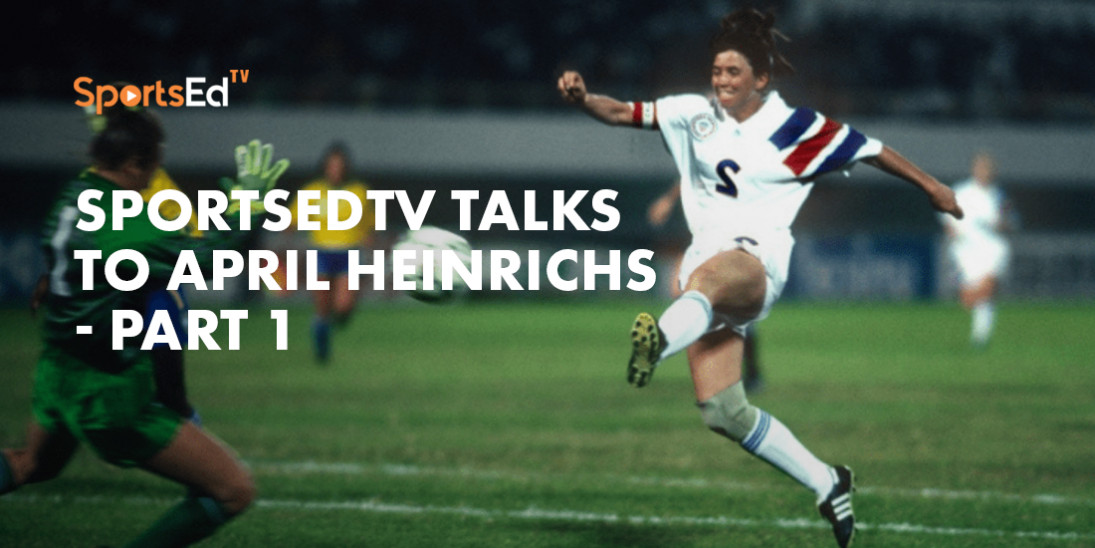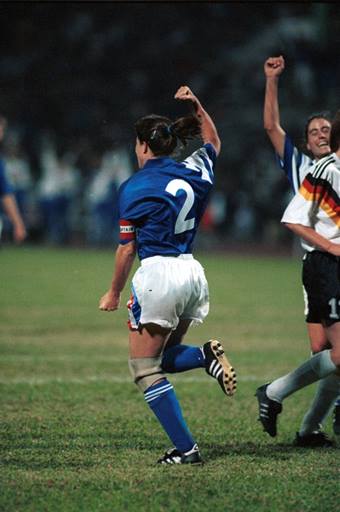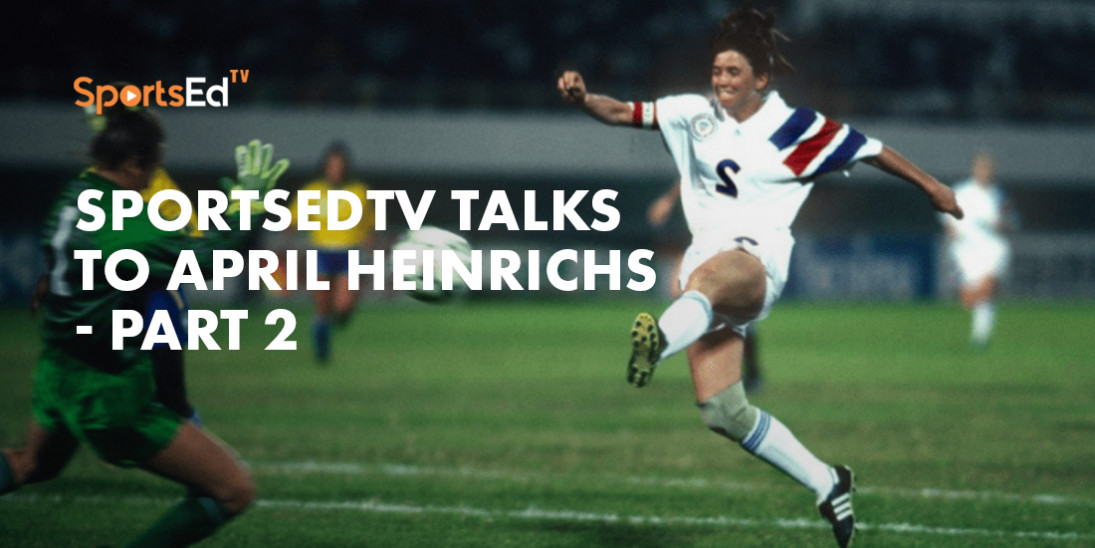Soccer
Welcome and thanks for visiting...

April Heinrichs On Her Youth and College Soccer Experience

April Heinrichs captained the US Women's National Team to win the first ever FIFA Women's World Cup in 1991, and in 1998 became the first ever female player inducted into the National Soccer Hall of Fame. She went on to be the head coach of the USWNT and led the team to a silver medal at the 2000 Olympics, 3rd place in the 2003 FIFA World Cup, and a gold medal at the 2004 Olympics. Here, she sits down with SportsEdTV for an interview about her life, story, and learnings.
SportsEdTV: The women's US national team was formed in 1985. To give some context of how recent that is, the men's team was formed exactly 100 years before that in 1885. This means that when you were growing up, there was no women's national team. As a kid, did you feel that there was a gap there, that there was a lack of either a future in the sport or role models to look up to?
April: You know, I don't think I was even aware that there was a men's team. The USA men's team wasn't like the German men's national team, where they're being highlighted every couple of weeks on their national television channels. So I don't think we felt the absence. At the time the idea of having women's soccer on TV was not common, so we weren’t really made aware of that difference, and I wasn’t caught up in thoughts of playing professionally at that age either. I was just playing and enjoying it.
April Heinrichs would go on to captain the US Women's National Team
SportsEdTV: Tell me about when you started soccer, and what that experience was like.
April: I started playing soccer around six or seven. It was the age at which your parents are trying to figure out what activities are right for you, so they put you in everything. I was in soccer, basketball, softball, and track. I played soccer in backyards with all the boys informally first, but officially started around six or seven. Our uniforms were reversible actually, on one side they were red and on the other side they were yellow. We had stirrup socks, and rather than shin guards we stuffed magazines in our socks. Even to me, it sounds like a story from the old old days! Right away from this young age, I loved soccer every minute of every day. I can't remember ever having a bad day on the field.
SportsEdTV: Walk us through your high school and college timeline, and the amazing correlation your journey had with Title IX and the development of women’s soccer in the US.
April: Yes. When I got to high school, the school team had started only the year before I got there. And when I arrived in college, the first national championship was just one year before. So my timing was perfect in the sense that I arrived right when opportunities were being established for women. I never went without them, but it was very close. Somebody just a few years older than me would not have had the same high school and collegiate experience and opportunities that I had. I think about that practically every day of my life, and am especially thankful for the Title IX legislation that was passed in 1972. The intended purpose of Title XI legislation was to offer women the opportunity to get an education and be employed at institutions, academic and otherwise. The unintended consequences of Title IX was that it also meant girls would have the same athletic opportunities as boys at high schools and colleges that had government funding. It was a significant force behind the emergence of women’s soccer in the country. By 20 years later in the 1990s, we were funding women's sports and trying to do it on an equal level to men’s, as a result of Title IX. So my path paralleled the writing of the legislation, as well as its influence that continued to expand over time.
SportsEdTV: What was your high school team like?
April: We actually won the state championship twice. It was very competitive. My high school soccer teammates were quite good. Three or four went on to play college soccer. And there were other good high school teams out there as well that we went up against. The high school soccer in Colorado was, and still is, quite good.
SportsEdTV: At what point did you start to feel like you were standing out on the field?
April: I realized that when I got to the University of North Carolina, at around 19 years old.
SportsEdTV: In high school, you didn't feel you were better than the other players around you?
April: I did have some understanding. I saw that I was one of the better players when we went to regionals and nationals. We were always one of the better teams and I was generally one of the better players. But I don't think I was able to process it. I was also surrounded by some very good players. If I didn't play well, they were the best players on that day. A collegiate environment is more elite. High school and club soccer, not so much. Once I got to college, it started to occur to me that this team I'm playing on just won the national championship, and I'm playing on their team, and I'm one of the youngest players here, and I was one of the better players there, too. Then I really started to want to be the best and I understood that I could do it. I quickly wanted to be the best player on the team, and it was the best team in the country, so it was a higher level environment and succeeding in it meant something different than it had in high school. So in university is when I first started establishing the goal of being the best. Back in high school, and even my first year of college, I was also playing basketball. And I had run track before too and competed in the Junior Olympics in track. It was when I got to North Carolina that I realized, ‘You know what, I may not make it to the Olympics as a track athlete or basketball player, but maybe I can do it in soccer.’ It wasn't until I was in college that that started to resonate.
SportsEdTV: You had a very successful college career. There were more than a couple awards, including three All-American First Team honors. As you approached the end of that time, what were you thinking for your future and what was happening in the professional women's soccer scene at that time?

April Heinrichs, playing at the University of North Carolina, where she won countless awards and titles, including 3 All-American honors and 3 NCAA Titles. She was the first player in Carolina women's soccer history to have her jersey number retired.
April: Our national team, in 1985, 1986, 1987, had very few training camps or events. In 1985, while I was in college, I had to miss what was the first ever women's national team trip due to being injured. The team went to Italy and they played in a tournament. The next summer we had tryouts and I made the national team again, and we went to Italy again and we won all the games this time. It was actually in Italy, in the Mundialito, where I was approached about playing professionally in Italy. At the time it was the best professional league in the world. There weren’t many others back then of course, but it was still one of the best. The Swedes, Norwegians, Germans might have already had a league, the Danish may have had a league, and then the Italians. So I accepted the offer, and then had one more semester to finish college before I would be off to Italy to start my professional career. I started taking Italian my last semester at North Carolina and finished my senior year. By January, I was living in Italy. And that's when I realized playing professionally was the dream. It wasn't until I was in Italy already playing, that I realized, ‘Oh, this is my dream. I love this.’
SportsEdTV: Before that, were you thinking of a different career path?
April: Yes. Originally I actually wanted to be an elementary school teacher. And in college, I switched to radio, television, and motion pictures. I wanted to produce movies and television and be a camera person. Maybe lighting and audio, but cameras were where it connected with my enjoyment of photography as well. So I thought I would move West and go into the television industry in Hollywood. Why not? But I graduated from college and nobody wanted me, and by that time I had the opportunities in soccer that I hadn’t really been aware of before. So I followed that path and went along to play professionally in Italy.
Part 2 is coming soon! Follow us on Facebook and Instagram so you don't miss it.






